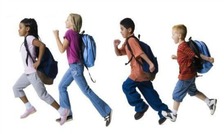
Kids, parents and college students alike are all preparing to return to school, and with the increased course load come stresses that can lead to neck and back pain. Proper ergonomics are the key of eliminating these strains, which in turn lead to optimal health. The following are some common influences that can attribute to poor posture and pain in young spines.
Backpacks:
Carrying heavy textbooks in poorly designed backpacks is the number one cause of chronic back conditions in young children. The American Chiropractic Association recommends that the backpack’s weight should be no more than 5-10 percent of the child’s body weight. (For a 50 lbs. child, nothing more than 5 lbs.) Anything heavier will cause the child to bend forward in attempt to support the weight, causing them to slouch and support the weight on the back, rather than on the shoulders by the straps. Here are some additional recommendations by the ACA for preventing back pain caused by backpack misuse:
Poor Sitting Posture:
Students sit for long periods of time while in school, and often in uncomfortable chairs and desks. This can lead to poor posture as well as unwanted muscle tension in the neck, shoulders and lower back. Although this factor is often unavoidable, speak to your child or teen about maintaining proper posture or consider bringing them to the chiropractor for a spinal check-up. Regular chiropractic adjustments can improve their posture and eliminate spinal stress.
Homework and After-School Activities:
Spending too much time at the computer or looking at any screen, from the iPad to video games, can lead to neck pain and headaches in kids and teens. As it is, most children do not get enough exercise in their day, and living a sedentary lifestyle leads to other health problems such as diabetes and obesity. Children who learn healthy habits early in life tend to keep them throughout adulthood. (If you think that your child or teen is not getting enough exercise, check out the following link on how to encourage them to get physically active from the American Academy of Pediatricians.) Even those who participate in organized after-school sports are at risk for lower back pain as well as other injuries. Misalignments in the spine caused by any of these activities, often go undetected in children and teens because they might not experience symptoms as adults do. With regular spinal check-ups by a chiropractor, these areas can be detected and eliminated, thus preventing any pain or injury to develop in the future. Furthermore, here is some additional information by the ACA for keeping your young athlete healthy.
Backpacks:
Carrying heavy textbooks in poorly designed backpacks is the number one cause of chronic back conditions in young children. The American Chiropractic Association recommends that the backpack’s weight should be no more than 5-10 percent of the child’s body weight. (For a 50 lbs. child, nothing more than 5 lbs.) Anything heavier will cause the child to bend forward in attempt to support the weight, causing them to slouch and support the weight on the back, rather than on the shoulders by the straps. Here are some additional recommendations by the ACA for preventing back pain caused by backpack misuse:
- Consider purchasing a backpack with wheels and a handle.
- Both shoulder straps should be worn. A backpack slung over one shoulder places the weight disproportionately over the body causing not only neck and muscle spasms, but also low back pain.
- The shoulder straps should also be adjustable so the backpack can be properly fitted to the body. Straps that are too loose can cause the backpack to dangle uncomfortably and cause spinal misalignments and pain.
- Wide, padded straps are very important and more comfortable.
- Bigger is not necessarily better- the more room there is in a backpack, the more your child will carry and the heavier the backpack will be. If the backpack is still too heavy, consider talking to your child’s teacher to see if the child can leave the heaviest books at school, and bring home only lighter hand-out materials or workbooks.
Poor Sitting Posture:
Students sit for long periods of time while in school, and often in uncomfortable chairs and desks. This can lead to poor posture as well as unwanted muscle tension in the neck, shoulders and lower back. Although this factor is often unavoidable, speak to your child or teen about maintaining proper posture or consider bringing them to the chiropractor for a spinal check-up. Regular chiropractic adjustments can improve their posture and eliminate spinal stress.
Homework and After-School Activities:
Spending too much time at the computer or looking at any screen, from the iPad to video games, can lead to neck pain and headaches in kids and teens. As it is, most children do not get enough exercise in their day, and living a sedentary lifestyle leads to other health problems such as diabetes and obesity. Children who learn healthy habits early in life tend to keep them throughout adulthood. (If you think that your child or teen is not getting enough exercise, check out the following link on how to encourage them to get physically active from the American Academy of Pediatricians.) Even those who participate in organized after-school sports are at risk for lower back pain as well as other injuries. Misalignments in the spine caused by any of these activities, often go undetected in children and teens because they might not experience symptoms as adults do. With regular spinal check-ups by a chiropractor, these areas can be detected and eliminated, thus preventing any pain or injury to develop in the future. Furthermore, here is some additional information by the ACA for keeping your young athlete healthy.

 RSS Feed
RSS Feed
